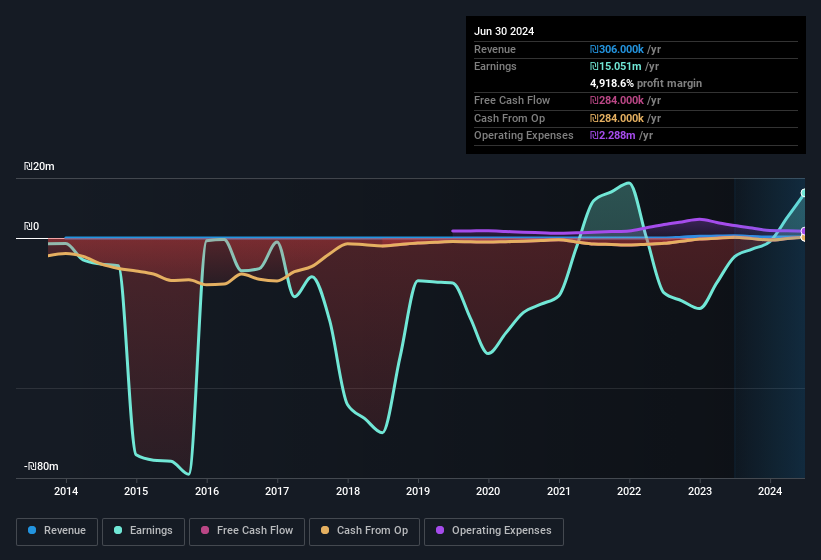Dna Group (T.R.)'s (TLV:DNA) Earnings Might Not Be As Promising As They Seem
Dna Group (T.R.) Ltd (TLV:DNA) posted some decent earnings, but shareholders didn't react strongly. Our analysis suggests they may be concerned about some underlying details.
View our latest analysis for Dna Group (T.R.)

Examining Cashflow Against Dna Group (T.R.)'s Earnings
In high finance, the key ratio used to measure how well a company converts reported profits into free cash flow (FCF) is the accrual ratio (from cashflow). To get the accrual ratio we first subtract FCF from profit for a period, and then divide that number by the average operating assets for the period. You could think of the accrual ratio from cashflow as the 'non-FCF profit ratio'.
Therefore, it's actually considered a good thing when a company has a negative accrual ratio, but a bad thing if its accrual ratio is positive. That is not intended to imply we should worry about a positive accrual ratio, but it's worth noting where the accrual ratio is rather high. To quote a 2014 paper by Lewellen and Resutek, "firms with higher accruals tend to be less profitable in the future".
Over the twelve months to June 2024, Dna Group (T.R.) recorded an accrual ratio of 0.63. Ergo, its free cash flow is significantly weaker than its profit. Statistically speaking, that's a real negative for future earnings. In fact, it had free cash flow of ₪284k in the last year, which was a lot less than its statutory profit of ₪15.1m. We note, however, that Dna Group (T.R.) grew its free cash flow over the last year. However, that's not all there is to consider. The accrual ratio is reflecting the impact of unusual items on statutory profit, at least in part. The good news for shareholders is that Dna Group (T.R.)'s accrual ratio was much better last year, so this year's poor reading might simply be a case of a short term mismatch between profit and FCF. Shareholders should look for improved cashflow relative to profit in the current year, if that is indeed the case.
Note: we always recommend investors check balance sheet strength. Click here to be taken to our balance sheet analysis of Dna Group (T.R.).
How Do Unusual Items Influence Profit?
Given the accrual ratio, it's not overly surprising that Dna Group (T.R.)'s profit was boosted by unusual items worth ₪14m in the last twelve months. While it's always nice to have higher profit, a large contribution from unusual items sometimes dampens our enthusiasm. When we crunched the numbers on thousands of publicly listed companies, we found that a boost from unusual items in a given year is often not repeated the next year. And, after all, that's exactly what the accounting terminology implies. Dna Group (T.R.) had a rather significant contribution from unusual items relative to its profit to June 2024. As a result, we can surmise that the unusual items are making its statutory profit significantly stronger than it would otherwise be.
Our Take On Dna Group (T.R.)'s Profit Performance
Summing up, Dna Group (T.R.) received a nice boost to profit from unusual items, but could not match its paper profit with free cash flow. On reflection, the above-mentioned factors give us the strong impression that Dna Group (T.R.)'sunderlying earnings power is not as good as it might seem, based on the statutory profit numbers. So if you'd like to dive deeper into this stock, it's crucial to consider any risks it's facing. When we did our research, we found 3 warning signs for Dna Group (T.R.) (2 are concerning!) that we believe deserve your full attention.
In this article we've looked at a number of factors that can impair the utility of profit numbers, and we've come away cautious. But there are plenty of other ways to inform your opinion of a company. Some people consider a high return on equity to be a good sign of a quality business. So you may wish to see this free collection of companies boasting high return on equity, or this list of stocks with high insider ownership.
New: Manage All Your Stock Portfolios in One Place
We've created the ultimate portfolio companion for stock investors, and it's free.
• Connect an unlimited number of Portfolios and see your total in one currency
• Be alerted to new Warning Signs or Risks via email or mobile
• Track the Fair Value of your stocks
Have feedback on this article? Concerned about the content? Get in touch with us directly. Alternatively, email editorial-team (at) simplywallst.com.
This article by Simply Wall St is general in nature. We provide commentary based on historical data and analyst forecasts only using an unbiased methodology and our articles are not intended to be financial advice. It does not constitute a recommendation to buy or sell any stock, and does not take account of your objectives, or your financial situation. We aim to bring you long-term focused analysis driven by fundamental data. Note that our analysis may not factor in the latest price-sensitive company announcements or qualitative material. Simply Wall St has no position in any stocks mentioned.
About TASE:DNA
Dna Group (T.R.)
Engages in the development, manufacturing, and marketing of patented ultrasound systems in Israel, North America, East Asia, and internationally.
Flawless balance sheet with slight risk.
Market Insights
Community Narratives



